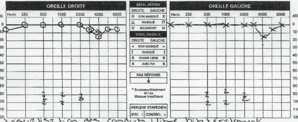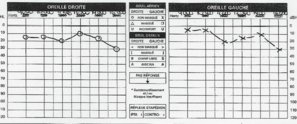Dear @attheedgeofscience,
Thank you very much for sharing with us your theory regarding hearing loss and T and your experience with LLLT/stem cell/HIFU. I developed T during mid-Oct and when I went to ENT/Audiologist at late Oct my hearing test turned out normal. T didn't go away and I went to Otoneurolwogist again and did a hearing test again including high frequency range. The test result has been withheld from me despite my effort to urge the Dr. to give me the HF audiogram. When I finally managed to get the audiogram I was shocked to discover there is a sharp decline (25dB) at 16kHz for the right ear. I wonder if it's the reason behind my T. Whether it is induced by Ototoxic drug (only took a very small amount) or AT I am not sure, but I do remember prior to developing T I had H, slightly muffled hearing preceeded by dizziness and balance issue, but I can't link it to any specific acoustic event (I have never been exposed to loud noise) that happened during the period. I've heard that stem cell treatment has improved your T and hearing. So far none of my doctors are helpful (my doctors did not recommend intratympanic injection as they conclude I have "normal" hearing, and my neurologist=doesn't know anything about EEG's value in diagnosis of T, plus he refused to prescribe me any medicine and he told me there's nothing he could do for me, ENT=the usual wait and see attitude) and I urgently need advice from someone who has experience. It would be very nice if you could give me some personal opinion/suggestions. Where can I find a Dr. who is really helpful and knowledgeable in T so that I can get a proper diagnosis and evidence-based treatment at this acute stage? Thank you very much.
xv


Thank you very much for sharing with us your theory regarding hearing loss and T and your experience with LLLT/stem cell/HIFU. I developed T during mid-Oct and when I went to ENT/Audiologist at late Oct my hearing test turned out normal. T didn't go away and I went to Otoneurolwogist again and did a hearing test again including high frequency range. The test result has been withheld from me despite my effort to urge the Dr. to give me the HF audiogram. When I finally managed to get the audiogram I was shocked to discover there is a sharp decline (25dB) at 16kHz for the right ear. I wonder if it's the reason behind my T. Whether it is induced by Ototoxic drug (only took a very small amount) or AT I am not sure, but I do remember prior to developing T I had H, slightly muffled hearing preceeded by dizziness and balance issue, but I can't link it to any specific acoustic event (I have never been exposed to loud noise) that happened during the period. I've heard that stem cell treatment has improved your T and hearing. So far none of my doctors are helpful (my doctors did not recommend intratympanic injection as they conclude I have "normal" hearing, and my neurologist=doesn't know anything about EEG's value in diagnosis of T, plus he refused to prescribe me any medicine and he told me there's nothing he could do for me, ENT=the usual wait and see attitude) and I urgently need advice from someone who has experience. It would be very nice if you could give me some personal opinion/suggestions. Where can I find a Dr. who is really helpful and knowledgeable in T so that I can get a proper diagnosis and evidence-based treatment at this acute stage? Thank you very much.
xv

 Member
Member


